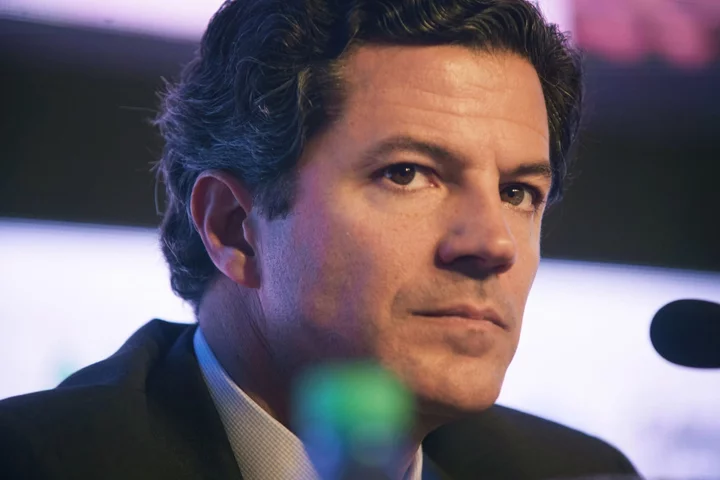Argentina’s presidential hopeful Patricia Bullrich would seek greater support from the International Monetary Fund to untangle currency controls as soon as possible if elected this year, according to one of her top advisers.
Luciano Laspina, an economist working closely with Bullrich, hinted that the hard-line politician may even request fresh IMF funding that goes beyond Argentina’s current $44 billion program, the largest ever provided by the Washington-based lender.
“It would be ideal to have some type of fire extinguisher to avoid any senseless currency runs,” Laspina, who is also a congressman, said in an interview from Buenos Aires. “The central bank is broke.”
Asked directly whether a reworked IMF deal under Bullrich would entail more money, Laspina replied: “It’s the International Monetary Fund’s decision whether it wants to support a stabilization and growth program that changes Argentina for the next 20 years.”
Subscribe Here: Follow All of Bloomberg News’ Coverage of Argentina Elections
Argentina has been struggling to meet its obligations with the Fund, even after it renegotiated a recorded $44 billion bailout provided by the Fund during the administration of former President Mauricio Macri. Economy Minister Sergio Massa, also competing for the presidency, last week made a deal with IMF staff to unlock a $7.5 billion loan disbursement in the second half of August, pending approval by the Fund’s board. That money, however, is largely meant for the government to repay principal debt from the previous loan.
Meanwhile, Argentina is resorting to creative measures to make good on interest payments due to the IMF. It has has already used its own Special Drawing Rights with the Fund, tapped a currency swap line with China, obtained a bridge loan from a Caracas-based developed bank, and on Friday it announced that Qatar was loaning the equivalent of $775 million in SDRs.
Bullrich will face off against Buenos Aires Mayor Horacio Rodriguez Larreta in an Aug. 13 primary vote, which will determine who moves on to the October general election. In-person polls give her a narrow lead over Larreta, although polls in Argentina’s last election failed to predict the outcome of the primaries. Also vying for the presidency is outsider libertarian Javier Milei, who has garnered attention by proposing an outright dollarization.
Read More: Argentine Economic Chaos Fuels Hard-Liner’s Presidential Bid
No IMF Talks Yet
Laspina described his conversations with the IMF so far as “practically null,” noting it would be premature to start talks before the primary vote. IMF officials anticipate more intense talks with opposition economists like Laspina after Aug. 13, according to people familiar with the matter.
The congressman from the agriculture-heavy province of Santa Fe proposes an economic plan that includes sharp cuts to public spending, exiting capital controls within a year and avoiding another sovereign debt restructuring as principal debt payments owed to private bondholders come due starting next year. Along with structural reforms and a revamped IMF deal, Laspina said that a Bullrich government could build enough public confidence to dismantle currency controls without greatly exacerbating annual inflation.
Consumer prices in Argentina are already rising by more than 115% a year, while nearly 40% of the population lives in poverty.
Read More: IMF to Loan Argentina as Much as $10.8 Billion This Year
Laspina, a former chief economist at Argentina’s Banco Ciudad, wouldn’t provide a more specific time frame on exiting capital restrictions or currency controls, though he said an entire year would be too long. He ruled out a fixed exchange rate like Argentina had in the 1990s or dollarizing the economy.
“We can’t tie ourselves to a fixed exchange rate because that condemns us to external shocks,” Laspina said.
A Bullrich government, would consider a few options for currency policy, he said. One possibility is an exchange rate that’s allowed to freely float within a certain range that’s enforced by the central bank — a plan temporarily applied at the end of Mauricio Macri’s government.
In the short term, Laspina also sees another possible policy route: a system with two official exchange rates intended to be temporary, where one rate would be weaker for exports and a stronger one for local transactions.
If elected, Bullrich would sharply reduce public spending by “no less than 3%” of gross domestic product to achieve a primary fiscal balance within the first year. The cuts would focus on reducing spending on state-owned companies, making the state more efficient, slashing generous subsidies to utilities and transportation and eliminating tax exemptions.
“If Argentina doesn’t fix its public accounts, it will enter a hyperinflation,” he said. The current “government is playing with fire by having postponed correction measures.”
(Updates with news of Qatar loan in sixth paragraph.)

